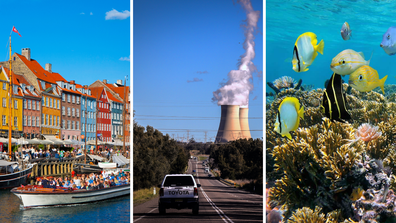[ad_1]
The agreement in Baku, Azerbaijan, on Sunday followed more than two weeks of bitter divisions and factional negotiations, thrown into chaos by boycotts, political bickering and the open celebration of fossil fuels.
At times there were fears the talks would explode as groups representing vulnerable small island states and least developed countries walked out of talks on Saturday. But at 2.40am on Sunday (8.30am AEDT), more than 30 hours after the deadline, the hammer finally fell on the deal between almost 200 countries.

“People doubted that Azerbaijan could deliver. They doubted that everyone could agree. They were wrong on both counts,” said Mukhtar Babayev, a veteran of Azerbaijan’s state oil company and COP29 president.
US$300 billion will go to vulnerable, poorer countries to help them deal with increasingly devastating extreme weather events and shift their economies to clean energy.
“It’s been a difficult journey, but we’ve reached an agreement,” said Simon Stiell, head of the United Nations Framework Convention on Climate Change.
“This new financial target is an insurance policy for humanity, amid worsening climate impacts affecting every country.”
The amount pledged, however, falls far short of the $1.3 trillion ($2 trillion) that economists say is needed to help developing countries cope with the climate crisis they least caused – and there has been a furious backlash from many developing countries.
In a fiery speech immediately after the hammer fell, India’s representative Chandni Raina criticized the $300 billion as a “miserable sum” and called the agreement “nothing more than an optical illusion” and unable to “address the enormity of the challenges we all face “.

Others were equally harsh in their criticism.
“We are leaving with a small portion of the funds that climate-sensitive countries urgently need,” said Tina Stege, Marshall Islands climate envoy.
Stege severely criticized the talks because they show “the worst political opportunism”.
Fossil fuel interests “are determined to block progress and undermine the multilateral goals we have been working towards,” she said in a statement.

COP29 focused heavily on finance, a vital climate issue but one of the most politically demanding.
Rich countries, which are largely responsible for historic climate change, agreed in 2009 to provide $100 billion a year by 2020 for developing countries. That promise, which was already considered woefully insufficient, was only fulfilled in 2022, two years after the deadline.
The task in Baku was to come up with a new number.
The new deal agreed on Saturday requires rich countries, including the US and European countries, to provide US$300 billion each year until 2035, made up of public and private finance.

Cult tourist spots that will most likely be wiped out by climate change
While the agreement also refers to the broader ambition of raising up to US$1.3 trillion, developing countries wanted rich countries to commit to a much larger share of that, with the money coming predominantly in the form of grants rather than loans, which fear that they will be further trapped in debt.
The G77 group of developing countries requested an amount of 500 billion dollars. But richer countries dismissed the higher figures as unrealistic given the current economic circumstances.
“We have reached the boundary between what is politically feasible today in developed countries and what would make a difference in developing countries,” said Avinash Persaud, special adviser on climate change to the president of the Inter-American Development Bank.
There has also been pressure for richer emerging economies such as China and Saudi Arabia to contribute to the climate finance package, but the agreement only “encourages” developing countries to make voluntary contributions and does not impose any obligations on them.
Li Shuo, director of the China Climate Center at the Asia Society Policy Institute, called the deal a “minor compromise” that reflected “the more difficult geopolitical terrain the world finds itself in.”

The summit came at the end of a year that was “almost certainly” the hottest on record and one in which the world was hit by deadly extreme weather events, including hurricanes, catastrophic floods, devastating typhoons and severe drought in southern Africa.
The urgency of dealing with climate change has never been clearer. But this will always be a tricky cop.
It happened in Azerbaijan, a petrostate, and it was overrun by fossil fuel interests. More than 1,700 fossil fuel lobbyists or industry players have registered to attend the talks, outnumbering delegations from nearly every country, according to an analysis by a coalition of groups called Kick Big Polluters Out.
The shadow of the election of Donald Trump in the USA also hung over the proceedings.
Trump has called the climate crisis a fraud, vowed to “drill, baby, drill” and vowed to pull the US out of the landmark Paris climate accord, raising concerns about the future of multinational climate action.

‘Climate laggard’: Nations best and worst on green future list
Saudi Arabia, the world’s biggest oil exporter, which has opposed ambitious action at past climate summits, appeared even bolder in Baku, publicly and emphatically rejecting any mention of oil, coal and gas in the deal.
“It was another dubious, oil-stained COP,” said Friederike Otto, a climate scientist at Imperial College London.
“Public interest in this COP has been low and cynicism seems to have peaked,” she said.
Many climate groups strongly criticized the summit and its outcome.
“These have been the worst climate negotiations in years because of the bad will of developed countries,” said Tasneem Essop, executive director of the Climate Action Network.
“This was supposed to be a financial COP, but the global north showed up with a plan to betray the global south.”
The outcome “offers false hope to those already bearing the brunt of climate disasters,” said Harjeet Singh of the Fossil Fuel Treaty Initiative.
“We must persist in our fight, demanding a significant increase in funding and calling developed countries to account,” he added.
[ad_2]
